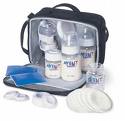Best Breast Pumps
 Many mothers nurse their babies without ever
using a pump. But for some moms, owning an
effective pump means they will make
exclusive breast milk feeding a success and
avoid formula.
Many mothers nurse their babies without ever
using a pump. But for some moms, owning an
effective pump means they will make
exclusive breast milk feeding a success and
avoid formula.
Women pump for many reasons: to relieve engorgement,
to have an emergency stash of milk in the freezer, to prepare a
bottle so mom can have a night out, to continue exclusively feeding
with breast milk when mom returns to work or school, or if there is
a situation where mom won’t be able to nurse for a few days and
wants to maintain her milk supply. Even if you plan to exclusively
breastfeed your baby, having a pump on hand may be a good idea.
Here are a few tips on finding a good breast
pump:
Assess your needs. If you'll only need a
pump for occasional use (such as a mom's
night out), a manual pump like the
Avent
Isis is all you need. If you'll be going
back to work full time or have a premature
baby who you will need to pump for
frequently, invest in a good hospital
quality, electric double pump like the ones
made by
Medela. In general, breast pumps
made by companies that also market infant
formula are to be avoided. They tend to be
poor quality and cause pain.
Breast pumps come in different shapes and styles, electric and
hand-powered. To determine which one to
purchase (or even rent) it
is important to determine what level of use you’ll require.
Manual
(or hand) pumps are easily obtained at many baby and drug stores and are perfect for occasional or short-term use. It is important to
look for a model that is easily cleaned so that the milk does not
become contaminated through improper cleaning. There are models
ranging from those that look like a bicycle horn (extremely
difficult to clean properly) to ones that look like a spray bottle
with a funnel attached. Pulling the handle (or cylinder, depending
on the model) creates negative pressure drawing the milk into a
receptacle, often times the bottle itself, making it easy to just
pop on a nipple and feed baby.
are perfect for occasional or short-term use. It is important to
look for a model that is easily cleaned so that the milk does not
become contaminated through improper cleaning. There are models
ranging from those that look like a bicycle horn (extremely
difficult to clean properly) to ones that look like a spray bottle
with a funnel attached. Pulling the handle (or cylinder, depending
on the model) creates negative pressure drawing the milk into a
receptacle, often times the bottle itself, making it easy to just
pop on a nipple and feed baby.
Electric pumps are more efficient and easier to use
than manual pumps and are used when the mother needs to pump for
more than the occasional use. They come in different styles and can
vary in price from over one thousand dollars to several hundred
dollars. It is possible to rent them, which may be more practical if
you only need it for a limited time.
Covering the middle ground between manual and electric pumps are
foot pedal pumps. They work just like the electric pump though
instead of using electricity, the mother presses down on a foot
petal to operate the pump.
Check with your pediatrician or lactation consultant for their
recommendations for your personal situation. The benefits of breast
milk have been well documented and you may find it to be a rewarding
experience.
Related article:
Choosing a Nursing Bra
Breast Pump Accessories:

